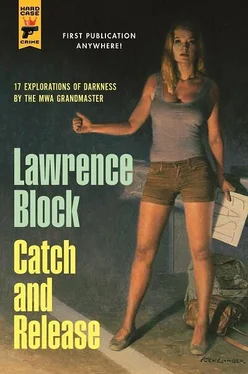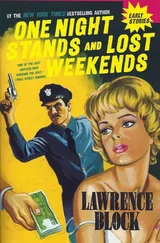“Arrested?” cried the doctor. “For what?”
“Arson,” the policeman said. “Didn’t he say the cigars were lost in a series of small fires? I suppose they could have charged him with two thousand counts of criminal arson.”
“Arson? They were his cigars, weren’t they?”
“As I understand it.”
“And doesn’t a man have the right to smoke his own cigars?”
“Not in a public place,” said the policeman. “But yes, in the ordinary course of events, he would have been well within his rights to smoke them. But he had so arranged matters that smoking one of those cigars amounted to intentional destruction of insured property.”
“But that’s an outrage,” the doctor said.
“Is it, Doctor?” The soldier puffed on his pipe. “You liked the story when the insurance company was hoist on its own petard. Now Archie’s hoisted even higher on a petard of his own making. Wouldn’t you say that makes it a better story?”
“A splendid story,” said the doctor, “but no less an outrage for it.”
“In point of fact,” the policeman said, “Archie could have been charged with arson even in the absence of a claim, the argument being that he forfeited the right to smoke the cigars the moment he insured them. Practically speaking, though, it was pressing the claim that triggered the criminal charge. Did he actually go to jail, Priest? Because that would seem a little excessive.”
The priest shook his head. “Charges were dropped,” he said, “when the parties reached agreement. Archie gave back the money, and both sides paid their own legal costs. And he got to tell the story on himself, and he was a good fellow, you know, and could see the humor in a situation. He said it was worth it, all things considered, and a real pre-Castro cigar was worth the money, even if you had to pay for it yourself.”
The other three nodded at the wisdom of that, and once again the room fell silent. The priest took the deck of cards in hand, looked at the others in turn, and put the cards down undealt. And then, from the fireside, the fifth man present broke the silence.
“Greed,” said the old man, in a voice like the wind in dry grass. “What a subject for conversation!”
“We’ve awakened you,” said the priest, “and for that let me apologize on everyone’s behalf.”
“It is I who should apologize,” said the old man, “for dozing intermittently during such an illuminating and entertaining conversation. But at my age the line between sleep and wakefulness is a tenuous proposition at best. One is increasingly uncertain whether one is dreaming or awake, and past and present become hopelessly entangled. I close my eyes and lose myself in thought, and all at once I am a boy. I open them and I am an old man.”
“Ah,” said the doctor, and the others nodded in assent.
“And while I am apologizing,” the old man said, “I should add a word of apology for my bowels. I seem to have an endless supply of wind, which in turn grows increasingly malodorous. Still, I’m not incontinent. One grows thankful in the course of time for so many things one took for granted, if indeed one ever considered them at all.”
“One keeps thanking God,” the priest said, “for increasingly smaller favors.”
“Greed,” said the old man. “What a greedy young man I was! And what a greedy man I stayed, throughout all the years of my life!”
“No more than anyone, I’m sure,” the policeman said.
“I always wanted more,” the old man remembered. “My parents were comfortably situated, and furnished me with a decent upbringing and a good education. They hoped I would go into a profession where I might be expected to do some good in the world. Medicine, for example.”
“‘First, do no harm,’” the doctor murmured.
“But I went into business,” said the old man, “because I wanted more money than I could expect to earn from medicine or law or any of the professions. And I stopped at nothing legal to succeed in all my enterprises. I was merciless to competitors, I drove my employees, I squeezed my suppliers, and every decision I made was calculated to maximize my profits.”
“That,” said the soldier, “seems to be how business is done. Struggling for the highest possible profits, men of business act ultimately for the greatest good of the population at large.”
“You probably believe in the tooth fairy, too,” the old man said, and cackled. “If I did any good for the rest of the world, it was inadvertent and immaterial. I was trying only to do good for myself, and to amass great wealth. And in that I succeeded. You might not guess it to look at me now, but I became very wealthy.”
“And what happened to your riches?”
“What happened to them? Why, nothing happened to them. I won them and I kept them.” The old man’s bowels rumbled, but he didn’t appear to notice. “I lived well,” he said, “and I invested wisely and with good fortune. And I bought things.”
“What did you buy?” the policeman wondered.
“Things,” said the old man. “I bought paintings, and I don’t think I was ever taken in by any false Vermeers, like the young man in your story. I bought fine furniture, and a palatial home to keep it in. I bought antique oriental carpets, I bought Roman glass, I bought pre-Columbian sculpture. I bought rare coins, ancient and modern, and I collected postage stamps.”
“And cigars?”
“I never cared for them,” the old man said, “but if I had I would have bought the best, and I can well appreciate that builder’s dilemma. Because I would have wanted to smoke them, but my desire to go on owning them would have been at least as strong.”
They waited for him to go on; when he remained silent, the priest spoke up. “I suppose,” he said, “that, as with so many desires, the passage of time lessened your desire for more.”
“You think so?”
“Well, it would stand to reason that—”
“The vultures thought so,” the old man said. “My nephews and nieces, thoughtfully telling me the advantages of making gifts during my lifetime rather than waiting for my estate to be subject to inheritance taxes. Museum curators, hoping I’d give them paintings now, or so arrange things that they’d be given over to them immediately upon my death. Auctioneers, assuring me of the considerable advantages of disposing of my stamps and coins and ancient artifacts while I still had breath in my body. That way, they said, I could have the satisfaction of seeing my collections properly sold, and the pleasure of getting the best possible terms for them.
“I told them I’d rather have the pleasure and satisfaction of continuing ownership. And do you know what they said? Why, they told me the same thing that everybody told me, everybody who was trying to get me to give up something that I treasured. You can guess what they said, can’t you?”
It was the doctor who guessed. “You can’t take it with you,” he said.
“Exactly! Each of the fools said it as if he were repeating the wisdom of the ages. ‘You can’t take it with you.’ And the worst of the lot, the mean little devils from organized charities, armored by the pretense that they were seeking not for themselves but for others, they would sometimes add yet another pearl of wisdom. There are no pockets in a shroud, they would assure me.”
“I think that’s a line in a song,” the soldier said.
“Well, please don’t sing it,” said the old man. “Can’t take it with you! No pockets in a shroud! And the worst of it is that they’re quite right, aren’t they? Wherever that last long journey leads, a man has to take it alone. He can’t bring his French impressionists, his proof Liberty Seated quarters, his Belgian semi-postals. He can’t even take along a checkbook. No matter what I have, no matter how greatly I cherish it, I can’t take it with me.”
Читать дальше








